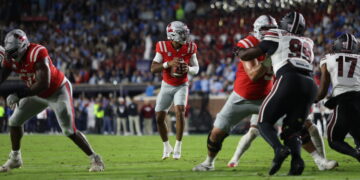Consumerism is quite literally one of the things that makes the world go round. It is deeply woven into the fabric of American society, as the material-focused culture is seen throughout day-to-day life.
It’s that urge to spend money just because you have it. It’s why you think you need to upgrade your phone every time a new one drops. Or maybe it’s that $8 coffee every morning to treat yourself rather than making it at home.
But we both know it is not a need.
Many signs point to consumerism becoming detrimental to our values as people. But to what extent? Are we brainwashed into believing splurging is a part of our social identity?
It has been said for years that we have been conditioned by the media to buy things we don’t truly need to gain satisfaction. With the boom of mass production and free-market capitalism, advertising created a desire for products once seen as luxuries. This idea of “buying more” framed consumption as key to success and happiness. Even during challenges like the Great Depression and World War II, prosperity was reshaped and reignited through the United States’ subsequent spending frenzy, reinventing the American Dream.
Over time, consumerism became a normalized part of life, with shopping evolving from a leisure activity into a necessity to signal status and identity. While purchases can bring momentary joy, they don’t provide lasting happiness. This creates a cycle of constantly pursuing new items for satisfaction, a concept known as the “hedonic treadmill.”
The moment we slipped into this pattern, we became pawns in the economy. Consumerism fuels businesses, stimulates job creation and fosters innovation, raising living standards. However, it raises the question: at what cost to financial stability and responsible management?
Perhaps the most prominent, damaging aspect of consumerism growth is the burden it places on holidays. While consumerism is a year-round phenomenon, it is best illustrated between Thanksgiving and New Year’s Day.
We start off with Black Friday, which, if you didn’t know before, was not always a positive connotation of shopping but rather a label for a literal market crash. A day notorious for customers tearing up stores for discounts. Significant portions of their revenue are generated during this time, too.
From then until Christmas, the season’s consumerism is charged by a mix of tradition, societal pressures and advertising tactics that exploit the emotional aspects of holiday gift giving.
This isn’t me telling you to get rid of that Amazon cart and not to get your mother anything. It just brings light to the tension between tradition and materialism.
For many people, the holiday season carries spiritual or personal significance, a time for reflection, gratitude and connection. These valid and significant reasons to celebrate are reduced to “spend, spend, spend” in our modern day. Shopping malls and online stores replace churches and community gatherings as holiday staples, and gift exchanges often take precedence over more meaningful forms of togetherness.
The expectation to buy gifts for friends, family and coworkers can lead to financial stress, especially for those already struggling economically. Many Americans go into debt each holiday season, purchasing gifts they cannot afford.
This phenomenon, known as holiday debt, has become a cycle in which people spend beyond their means due to cultural pressure, only to face the financial consequences in the new year.
This pressure trickles down to those who are the least financially stable in our society — young people. The average college student likely lacks the means to fund holiday purchases for all of their friends and family, but still feels all the pressure to make it happen.
But society, as it tends to do, is pushing back against some of these century old trends.
While consumerism remains a dominant force in American society, there are signs that attitudes may be shifting. Movements such as minimalism, anti-consumerism and sustainable living encourage people to resist the pressure to buy new items constantly and instead focus on experiences, relationships and sustainability.
Consumerism has its benefits, particularly for economic growth, but it also comes with significant drawbacks. Sustainability should be the chief concern of not only individual consumers, but the country as a whole and the businesses which operate here.
Chequoia Adderley is a senior integrated marketing communications major from Pascagoula, Miss.





































